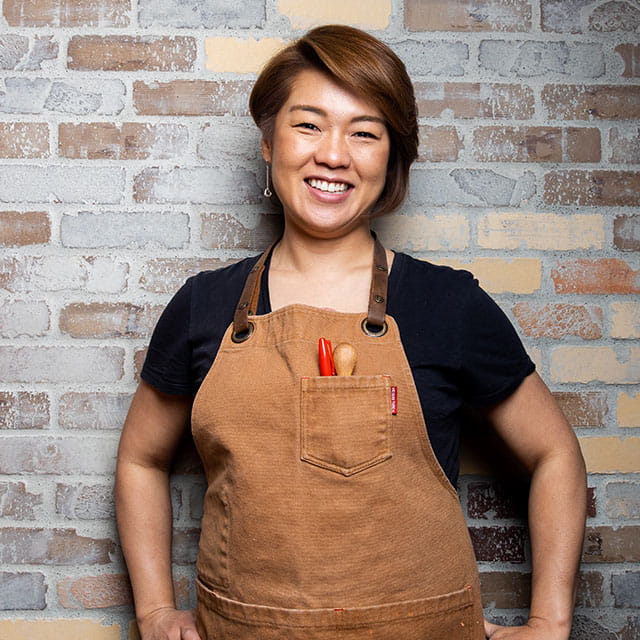
Chef Jinhee Lee
We stopped by Jin Bar to hear more of her incredible journey towards becoming Calgary’s Korean comfort go-to. View Culinary Connections for more.
Read BioEarly in his professional career, Kris Moon got his start in food as a graduate of the Institute for Integrative Nutrition, certified in holistic nutritional counselling.
First joining The James Beard Foundation (JBF) in 2007, Kris directed the operations of Greenwich Village’s James Beard House, initiating events with feature culinary leaders before moving on to execute special events with the Foundation of AIDS Research. He returned in 2011 as JBF’s Director of Charitable Giving which was followed by a promotion to Senior Director of Strategy and Development and, eventually, Vice President.
Kris has been credited for the development and growth of JBF’s Young Professionals Committee while making numerous appearances on-air and in-print on behalf of the Foundation.
We spoke to Kris for his respective outlook on the roles, challenges and impact of sustainable food-systems in North America.
Establishing a sustainable food-system is at the forefront of The James Beard Foundation’s (JBF) mandate. Could you explain the current challenges in our food-system that chefs should be aware of and some of the implications they will have on their restaurants?
There are a number of challenges facing chefs and restaurants today. Through our JBF Impact Programs, we aim to engage the culinary community in the process of improving food-systems through thought leadership, education and advocacy.
With so many topics to explore, it was important for our Foundation to identify core issue areas to initially focus on. After speaking with the community about what was important to them, we identified the following key areas: childhood nutrition, food waste reduction plus sustainable meats, seafood and fish. Policy continues to play an important role in many of these topics, ultimately affecting a chef through the pricing they must pay for the product(s) they prefer to source.
This is why we encourage and educate this community on how to advocate for the food-system they believe in – because legislative proceedings, from the Farm Bill to decisions on healthcare and minimum wage, have direct implications on their businesses.
The JBF launched Chefs Boot Camp for Policy and Change – an opportunity that invites civically and politically-minded chefs to become more effective leaders in food-system change. How can these chefs work to create a fair, just and sustainable food-system in their restaurants, while continuing to create healthy and delicious menu options?
Through the Chefs Boot Camp Program, we strive to help chefs embrace that they aren’t just talented people who make delicious food but also small business owners, economic drivers, employers, community leaders and cultural influencers. As these chefs step into this power, they begin to realize the impact each of their choices has, whether it’s who they buy their animal proteins from because of how they were raised or the ways each chef chooses to address wasted food in their business(es). Recognizing their own power and then making incremental changes to support the food-system they’d like to see across the board is incredibly powerful.
How do chefs play a crucial role in communicating the importance of establishing a sustainable food-system to their peers?
Chefs have become increasingly involved in these conversations as of lately. I often say that ten years ago, if you asked a chef about their cooking they’d tell you their cuisine style and any influence reflected in their dishes. Today, you can ask a chef about their food and then you’ll inevitably hear about their purveyors, the way they choose to source, and how they message their food to their guests and within the media. As more and more chefs do this, even more of them are embracing the power – and some would even say responsibility – they have to change the food-system.
For chefs taking on these issues facing the food world, what would be one piece of advice you would provide?
I would remind them that this is a marathon, not a sprint. A very wise chef once said, “there is nothing sustainable about a restaurant that can’t keep its doors open.” Therefore, my advice would be for these chefs to pick one thing to focus so that it doesn’t feel overwhelming, and then work from there.
If more and more chefs become actively involved in programs that advocate for a sustainable food-system, such as The James Beard Foundation’s Food Summit or Chefs Boot Camp for Policy and Change, what impact could this have on their restaurants and the dishes they serve?
The impact could be tremendous. Today, an increasing amount of consumers are enjoying a larger percentage of meals outside of the home. This means that the culinary community has rising influence over what America eats as a whole. Chefs are both tastemakers and trendsetters so as they continue to take steps to support a more sustainable food system in their restaurants, not only will their peers follow suit but the consumer will also be educated along the way.